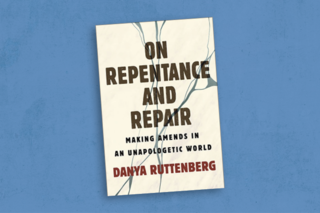
A group of us at All Saints, Collingwood, recently completed a study of this book and I compiled a summary of it for our parish newsletter, passed on in hopes that this post stirs some interest in the book. Michael+
“In a moral universe, there is work to do whenever harm is inflicted”. Rabbi Danya Ruttenberg
Through Lent and into the season of Easter, a number of us read a book called On Repentance and Repair: Making Amends In An Unapologetic World. The author, Danya Ruttenberg, is a young American rabbi and scholar who has thought long and hard about why we as a society have such a hard time truly saying that we are sorry. For example:
- Individuals hide behind anonymity to be horrible on social media;
- Celebrities are caught being abusive and sexist and then complain that they have been cancelled;
- Corporations make mealy mouthed statements about their misdeeds, vetted by lawyers and PR departments:
and
- Governments struggle to right old wrongs.
As Ruttenberg carefully and passionately explains it, anyone who has committed harm has work to do to fix it. She defines harm as “hurt, injury, or damage of some sort, whether mental, emotional, or physical, which may be sustained for a brief amount of time or across generations”.
The only remedy for harm, she writes, is the hard work of repentance. Repentance involves the offender recognizing, naming, and owning the harm they’ve done, doing the hard soul work necessary to change their character and behaviour, and making a sincere apology that includes, if necessary, offers of compensation for loss and injury.
A true apology, she writes, “is about trying to see the human being in front of you, to connect with them … to make it clear - abundantly, absolutely, profoundly clear - that … their feeling better matters to you”.
As Christians, we found some of the book challenging, as Ruttenberg reports that the Jewish tradition does not place the same emphasis on forgiveness as Jesus did. Forgiveness, she writes, should never be required of the victim if the offender is not truly penitent, or if the offence is unforgivable. While nursing a grudge can be harmful, and sometimes forgiveness may be someone saying “I’m going to forget an offence you caused me even if you’ll always be a horrible person”, the decision to forgive is always the victim’s.
Forgiveness is also not required if there is a power imbalance and where forgiveness might simply continue patterns of injustice. For example, she notes the habit of reporters asking African American families if they forgive the police for unjustified shootings of their loved ones. Do expectations that families will apologize merely perpetuate cycles of violence and police brutality?
Finally, Canadians may find the book challenging because, even if successive governments have apologized to indigenous communities for longstanding injustices, Ruttenberg challenges the validity of these apologies if these communities still don’t have good drinking water and still languish in poverty. As she writes, “The [Canadian] government is still committing harm, environmental injustice, colonialist land theft, and more”. Apologies only matter if there’s change: “Without transformation, there’s no repentance”.
While most of us found this a hard and challenging read, I think we all felt better for it. Repentance is part of our vocabulary as Christians, and we can always use a bracing and honest account what hard work it can be, and how necessary it is. Thank you, Rabbi Danya, for calling us to the work of being better people.


No comments:
Post a Comment